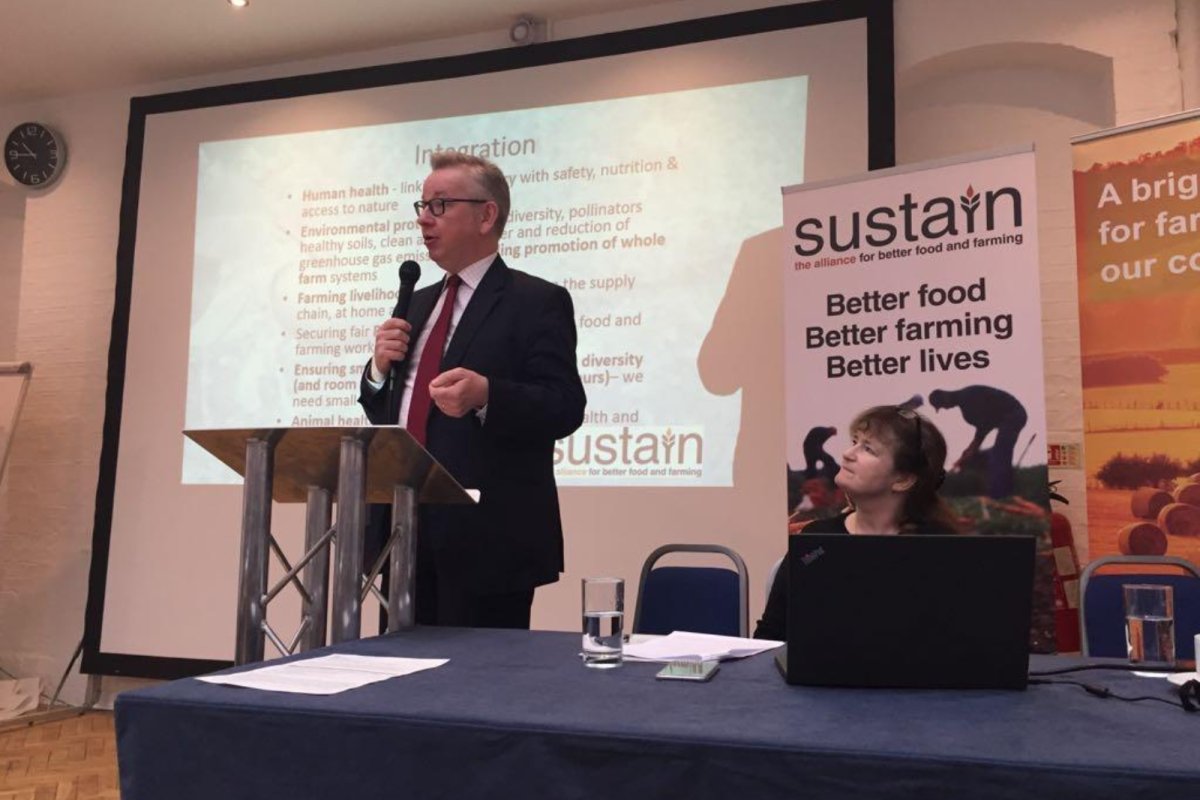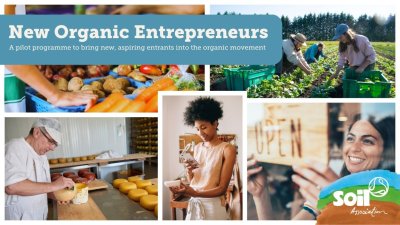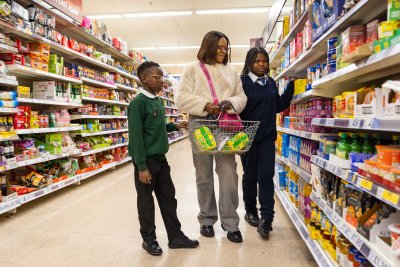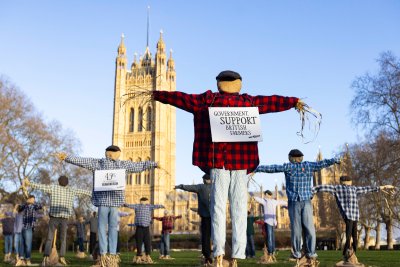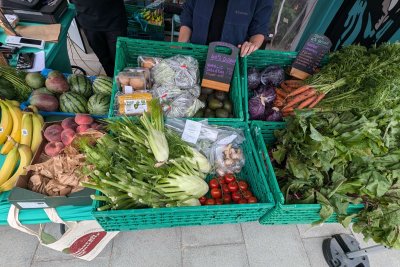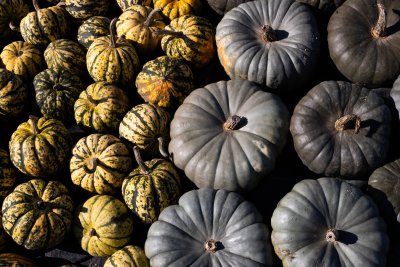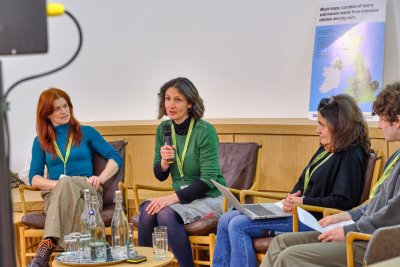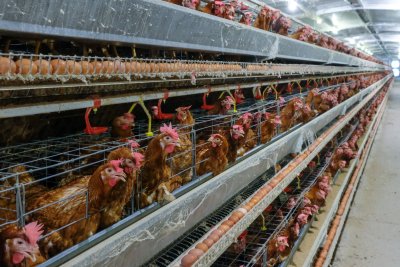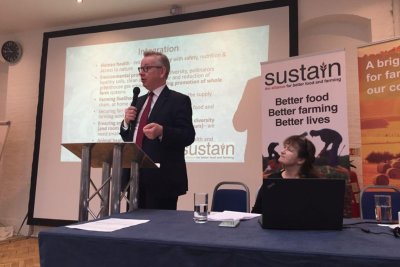 Michael Gove MP then Defra Secretary speaking at our event in 2018. I look on... Credit: Sustain
Michael Gove MP then Defra Secretary speaking at our event in 2018. I look on... Credit: Sustain
Poly-crises in food need systemic action and smart politics
Our outgoing Head of Sustainable Farming Vicki Hird looks at what’s ahead, what we can achieve as an alliance, and takes a few moments for reflective thoughts.
There's no hiding it. We are teetering on the brink. Climate and nature crises, rising malnutrition from both excess as well as poverty and inequality, conflicts and destabilised communities are already with us. The super-sophisticated, fossil-fuel based, increasingly processed global food supply systems, built up over 50 years are going to be obsolete. And governments need to accept that.
In the UK, the belief in, and support for, our highly concentrated and competitive food sector, delivering ever more processed food, will have to shift. Yes, it’s been great in many ways. But now we need to acknowledge the huge cost in terms of ill health, emissions, collapsing natural ecosystems, and non-resilient farming. We need a new model. It is becoming a hotter political issue, albeit too small so far.
What can a big broad NGO alliance do to tackle these huge issues, and promote genuine, fair and lasting solutions for our farming and food system? Can we seize the moment, and radically increase the level and impact of our lobbying to match? Can we find great farming and food trading solutions to scale out? Can funders support that? I'd say yes and that they – and we – need to take more risks.
The only way we can exert enough influence is to do it collectively, loudly, and crucially building an active mass movement for change, inside industry, in key institutions and among the public... Involving everyone from farmers and growers to health professionals and citizens, old and young.
Resistance to change will be fierce
Business as usual suits those in charge and means their lobbying gets bigger and better, loaded with cash. It’s not just fossil fuel companies that are the ‘pollutocrats’ (it’s in the urban dictionary, a sign of the times!). The huge rise in factory farming is just one, horrible, example.
Their marketing of the kinds of food based on commodity ingredients that are 'cheap' to source, but which puts farmers on a treadmill, and harms our shared home (shared with nature as well as each other), our health, workers and farmed animals. The huge costs are borne by society, often by those with the least blame, the most ignored voices and little means to act. Meanwhile, the critical idea of fairness in food systems just gets buried.
Gloomy, I know. Successes are rare for us campaigners. For each step forward - a new clause in a piece of legislation, a renewed policy, a legal win, a big public response. My experience over the years suggests these are too often swiftly followed by a backward step.
To illustrate…I’ve been back at Sustain for my latest farming campaign stint for seven years, re-joining as Head of Sustainable Farming a short time after the historic Brexit vote. For me, the slow but exciting steps towards a post-Brexit farm support policy, based on public money for broad public goods and involving many hours of meetings, pilots, tests and trials have been rewarded with a ghost of the initial promise. I remain hopeful it will, eventually, deliver. Revolutions do take time.
But I can’t even begin to explain the pain of seeing the National Food Strategy being entirely dropped - and even the few outcomes that were promised are disappearing. And then there are the emerging trade deals which will so clearly undermine stalwart efforts by British farmers to improve farm systems, tackle climate change, restore nature, save our antibiotics and improve animal welfare. Such unfettered free trade idealogy, with Rees-Mogg and his hormone beef, really united the farming, welfare, health and conservation community in exciting ways I've never seen before.
Seeds of hope
Despite all this, I remain optimistic. The expertise and determination in our movement are galvanising, as is our sense of common purpose. There are fabulous farmers and food traders out there to show how it can be done better. The science is so clear, and some politicians and policy-makers are getting it. Even some enlightened corporations get it, although their pursuit of profit, of a competitive edge, still stays their hand from the systemic changes needed.
Enter the people with latent power. Those who have joined Sustain members or engaged in new routes for action. They recognise they need to act as citizens, consumers and pioneers of better ways forward with agroecology, nature and just transitions at the centre.
We must build together the huge numbers we need to shift the politics. We must present a great evidence base and systemic solutions whilst showing how narrow, simplistic, and false solutions will not be tolerated.
We can’t sort any of the climate, nature and health crises without changing how and what we farm and eat. It really is that simple.
What we have achieved
Leaving Sustain (again) after seven great years is a wrench and I will stay in touch, involved in some way or another. My new home is mainly The Royal Society of Wildlife Trusts, where I will be working on agriculture, land and food, so remaining close to Sustain.
And it’s good to look at what we have achieved when we work together, pooling expertise, tactics and the drive for change. Reflecting on what the alliance has achieved on farming since the Brexit referendum (a key moment and which led to my return), we have:
- Delivered a revolutionary Agriculture Act, which has good ambition on delivering for society and even a clause on fair dealing in all supply chains and which mentions agroecology.
- Worked to get new environmental farm support that ensures a wide range of outcomes including healthy soil and agroecology (albeit far too weakly right now) and making sure no farm is left behind.
- Steered the Grocery Code Adjudicator through two reviews and stopped it being abolished. With unfair dealing for farmers and growers rife, it is needed more than ever.
- Ensured new awareness of the need to tackle unfairness in ALL supply chains and build the alternatives - with a huge response to our research on where the food pound goes (Unpicking Food Prices) and now with Riverford Organic’s latest poll (please sign and share).
- Produced numerous groundbreaking and influential reports and research (see here) from trade to food workers, fair deals to ELM schemes.
- Put Fringe Farming on the map - a recognition in many new places that we need a renaissance in agroecological market gardens in the peri-urban space. As I remember saying at this initiative’s first meeting in 2020, the peri-urban agroecological food growing revolution is just round the corner!
- Created a huge coalition – a working party and partnerships recognising that – as the old saying goes – if you want to go fast, go alone; if you want to go far, go together.
And so much more. It's funny that this is the fourth time I’ve stopped working for this alliance. It was 1994 when I first volunteered at SAFE Alliance (which merged with the National Food Alliance to become Sustain back in 1999). Back then, I wrote a report called The Politics of Industrial Agriculture. I wonder where that is now? It was all CAP and GATT and sugar quotas. One thing certainly doesn't change: acronyms. Now it’s WTO, CPTPP, ELMS, SFI, LR ad infinitum... Also back then, the new agri-environment schemes had emerged under CAP Regulation 2078 and I cruised the UK talking to farmers all about it.
When I got a job at SAFE, we launched the ‘Food Miles’ campaign to great impact, a concept that helped fuel a generation of campaigning for farmers markets, better food retail, connecting farmers with shorter supply chains and public procurement, and supporting diverse agroecological farmers. It was never only about transport emissions.. BSE, Foot and Mouth and Edwina Currie’s faux pas on eggs rocked British farming, and we were able to champion sensible solutions to building back confidence and resilience, including higher standards in public sector food procurement (still waiting).
That’s why Sustain’s current work on local and regional systems and infrastructure and public sector food procurement may feel like blasts from the past to Sustain veterans, but this work remains so vital to scale up massively better, farmer-focussed routes to market, driven by laws, standards, and public and institutional support
I’ve always taken huge solace and hope from working with great farmers and growers - the farsighted organic sector, agroecological and regen farmers and our friends in the pasture for life, landworkers and nature friendly farmers movements. The packed Oxford Real Farming Conference and Groundswell events are signals that this movement is growing in size, voice and confidence. It’s also global and more diverse than ever. And Sustain staff are, as ever, wonderful to work with. Thank you.
I am also seeing now so many more farmers embrace new thinking, whilst their news sources – the farming magazines like Farmers Weekly - are unrecognisable from the ones I had to read in the mid ‘90s. I am so cheered to see that it is now very well established that farming is at its best and will be resilient through being nature and climate friendly and far more diverse in so many ways.
Vicki Hird is taking up the role of Head of Sustainable Farming and Land Use for the Royal Society of Wildlife Trusts (which is itself a long-standing and highly valued member of the Sustain alliance). Vicki Hird is author of the book Rebugging the Planet. Follow Vicki on X (formerly know as Twitter): @vickihird @WildlifeTrusts and of course always follow Sustain @UKSustain
Sustainable Farming Campaign: Sustain encourages integration of sustainable food and farming into local, regional and national government policies.
Sustain
The Green House
244-254 Cambridge Heath Road
London E2 9DA
020 3559 6777
sustain@sustainweb.org
Sustain advocates food and agriculture policies and practices that enhance the health and welfare of people and animals, improve the working and living environment, promote equity and enrich society and culture.
© Sustain 2025
Registered charity (no. 1018643)
Data privacy & cookies
Icons by Icons8
